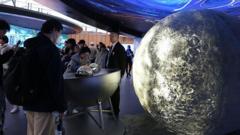Despite significant trade barriers between the US and China, the China National Space Administration (CNSA) has permitted access to Moon rocks collected during its 2020 Chang'e-5 mission.
China Opens Lunar Sample Vault to US Scientists Amid Trade Tensions

China Opens Lunar Sample Vault to US Scientists Amid Trade Tensions
China has announced it will allow US-based scientists, along with researchers from five other nations, to study its lunar samples, marking a rare moment of scientific collaboration amid ongoing trade disputes.
China has overcome political hurdles to permit a rare scientific collaboration with the United States, allowing examination of its lunar samples amidst heightened trade tensions. The CNSA disclosed today that institutions including Brown University and Stony Brook University have secured access to these materials, viewed as "a shared treasure for all humanity".
CNSA Administrator Shan Zhongde emphasized the collaborative nature of the project, highlighting that the samples “have very little to do with politics.” He noted that restrictions exist on space technology transfers but reiterated that this exchange of Moon rocks poses no military significance.
In contrast, US lawmakers imposed the 2011 prohibition on collaborations with Chinese entities, necessitating Congress's approval for any cooperative efforts between NASA and China. Former Space Policy Institute director John Logsdon pointed out that the examination of these lunar samples reflects "international cooperation in science," which traditionally transcends geopolitical strife.
Trade relations remain tense, with the US imposing tariffs on Chinese goods as high as 245%, while China retaliated with up to 125% tariffs on US imports. Although former President Trump hinted at possible de-escalations, Beijing refuted claims of ongoing negotiations.
The Chang'e-5 samples have garnered attention due to their intriguing geological timeline. Dr. Logsdon conveyed that these samples appear to be about a billion years younger compared to those retrieved during the Apollo missions, implying that volcanic activity on the Moon occurred more recently than previously believed.
Despite attempts last year by US and Chinese officials to negotiate a sample exchange, only the current collaboration has materialized. Joining the US institutions are research teams from France, Germany, Japan, Pakistan, and the UK.
Shan further expressed China's optimistic outlook for broadening its scope of international space collaborations, affirming, "I believe China’s circle of friends in space will continue to grow."
CNSA Administrator Shan Zhongde emphasized the collaborative nature of the project, highlighting that the samples “have very little to do with politics.” He noted that restrictions exist on space technology transfers but reiterated that this exchange of Moon rocks poses no military significance.
In contrast, US lawmakers imposed the 2011 prohibition on collaborations with Chinese entities, necessitating Congress's approval for any cooperative efforts between NASA and China. Former Space Policy Institute director John Logsdon pointed out that the examination of these lunar samples reflects "international cooperation in science," which traditionally transcends geopolitical strife.
Trade relations remain tense, with the US imposing tariffs on Chinese goods as high as 245%, while China retaliated with up to 125% tariffs on US imports. Although former President Trump hinted at possible de-escalations, Beijing refuted claims of ongoing negotiations.
The Chang'e-5 samples have garnered attention due to their intriguing geological timeline. Dr. Logsdon conveyed that these samples appear to be about a billion years younger compared to those retrieved during the Apollo missions, implying that volcanic activity on the Moon occurred more recently than previously believed.
Despite attempts last year by US and Chinese officials to negotiate a sample exchange, only the current collaboration has materialized. Joining the US institutions are research teams from France, Germany, Japan, Pakistan, and the UK.
Shan further expressed China's optimistic outlook for broadening its scope of international space collaborations, affirming, "I believe China’s circle of friends in space will continue to grow."

















